Melasma
Melasma can affect anyone, but it is more prevalent among young women with darker or olive skin types. It is also associated with female hormones estrogen and progesterone, making it more common in women who are pregnant, using hormone-based birth control (particularly oral contraceptives), or taking hormone replacement therapy. Because of this, melasma is sometimes called the “pregnancy mask.”
A skin consultation with one of our expert Dermatologists can start you on your healthy skin journey. Read more about melasma and schedule an appointment with Dermatology Affiliates today.
Examples of Melasma
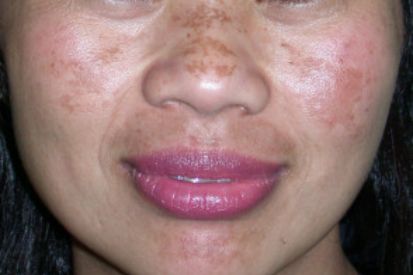
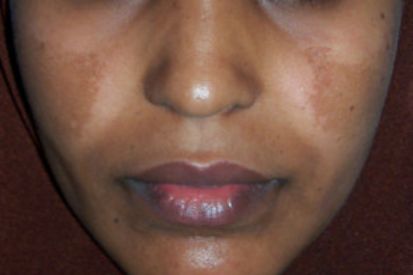
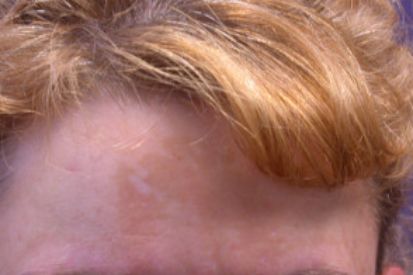
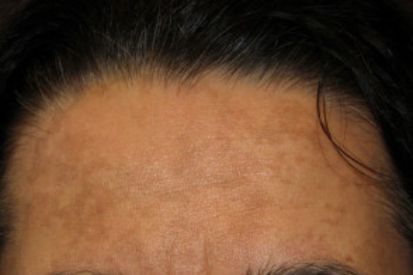
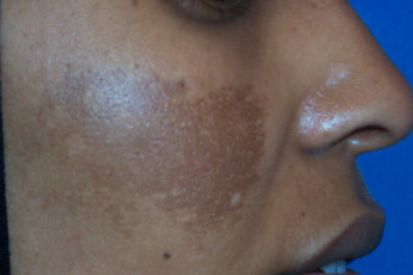
What are the Symptoms of Melasma?
- Very common skin disorder that occurs on areas of the face that are exposed to the sun, creating dark discolorations on the skin.
- Melasma generally manifests itself in a brown or gray discoloration across the cheeks, forehead, nose, chin, or upper lip.
- Melsama is most often uniform and symmetrical on both sides of the face.
Causes of Melasma
- Melasma can affect anyone, but more prevalent among young women with darker or olive skin types.
- Associated with female hormones estrogen and progesterone, making it more common in women who are pregnant.
- Melasma occurs with sun exposure.
- Certain skin products can irritate or worsen melasma.
How to Prevent Melasma
- Sunscreen: Apply a broad-spectrum sunscreen with a high SPF daily, even on cloudy days. This shields the skin from UV rays, a significant contributor to melasma.
- Sun Avoidance: Minimize sun exposure, especially during peak hours. Wear wide-brimmed hats and protective clothing when outdoors.
- Skincare Routine: Use skincare products that contain ingredients like niacinamide, vitamin C, or alpha arbutin known for their skin-lightening properties. Consult a dermatologist for personalized recommendations.
- Hormonal Management: For women, discussing hormone-related triggers with one of our trusted dermatology providers and exploring birth control options that may not exacerbate melasma can be beneficial.
- Avoiding Irritants: Limit the use of products or treatments that may irritate the skin, potentially triggering melasma. This includes harsh chemical peels or abrasive exfoliants.
- Pregnancy Planning: For women experiencing melasma related to pregnancy, consulting with a healthcare provider before conception can help manage hormonal changes that may contribute to melasma.
- Healthy Lifestyle: Adopting a balanced diet, staying hydrated, and managing stress contribute to overall skin health.
Melasma FAQs
Melasma is a common skin condition that results in brown or gray-brown patches, typically on the face. Hormonal changes, sun exposure, and genetics can contribute to its development. It is commonly linked with hormonal fluctuations such as pregnancy or birth control use, melasma can also appear as a temporary condition linked to these shifts. Proper management and protection can help reduce its appearance.
The positive news is that melasma is treatable. Dermatologists offer a range of treatments, such as topical creams, chemical peels, and laser therapies. With appropriate care, these patches can diminish over time.
Sunscreen isn't only for sunny days; applying it daily, even when it's cloudy, helps prevent melasma from worsening. It acts as a protective barrier for your skin, keeping those stubborn patches from getting darker.
Using makeup while you have melasma is not only safe, but can help boost confidence. It is important to select products that won't aggravate your melasma. Dermatologists can suggest makeup options that effectively conceal while remaining gentle and non-irritating to your skin.
From our QualDerm Family of Brands: The Importance of Sunscreen for All Skin Tones
How to Treat Melasma
We pride ourselves on working closely with patients, providing guidance on skincare routines, and recommending products to manage melasma effectively. Regular follow-ups ensure progress monitoring and adjustments to treatment plans, supporting you on your journey to healthy skin.
Featured Blogs
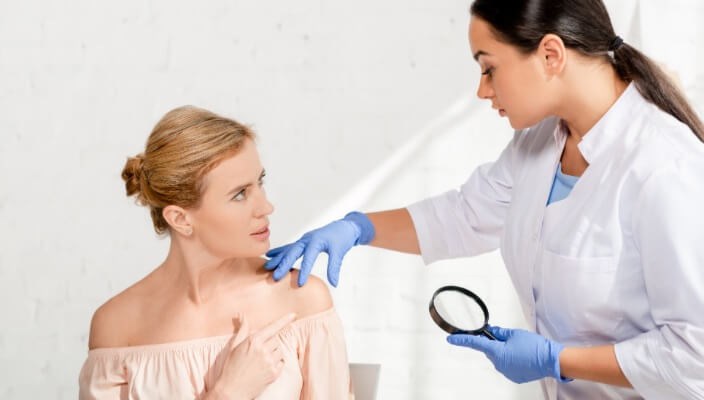
- General Dermatology
- Skin Care
- Chronic Skin Conditions
Skin tags are benign growths of excess skin which form in response to rubbing and irritation. Read more to learn about what we can do about them.
Read More
- General Dermatology
As the U.S. population ages, the number of Americans who suffer from skin diseases will continue to rise, according to the American Academy of Dermatology (AAD).
Read More
- Skin Cancer
- General Dermatology
- Sun Safety
A skin cancer story shared by a Dermatology Affiliates employee. Learn how easy it is for skin cancer to sneak into your life in many ways.
Read MoreFeatured Products
Check your local office for current stock!
Check your local office for current stock!


